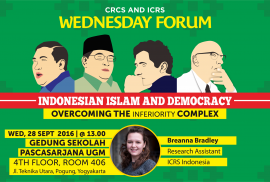
Abstract
Indonesian Islam connotes a pluralistic form of faith that is open and deeply engages local-specific cultures that concurrently emphasize a rigorous pursuit of social justice and equality for all. Despite the voluminous scholarship on Indonesian Islam, its correlation with Muhammadiyah’s “Islam Berkemajuan” and Nahdhatul Ulama’s “Islam Nusantara”—each having its own vision for a good society—remains woefully unexplained. This paper explores the interplay between Indonesian Islam and the praxis of democracy within the historical context of overcoming an apparent inferiority complex suffered by some segments of the Muslim community. The authors argue that as much as Indonesian Islam may have proven itself to be distinct from ‘the other Islams’, commonly found in its birthplace in the Middle East, there is still much to be desired for in terms of how to confidently overcome the historical baggage as a once colonized people. Using Said and Foucault’s analytical frameworks, the paper argues for a less humble attitude toward the propagation of Indonesian Islam to the outside world, given the protracted period of instability in the Middle East, ongoing terror attacks in different parts of the world and the politics surrounding Islamophobia.
Speaker
Breanna Bradley is an undergraduate student at Georgetown University’s Edmund A. Walsh School of Foreign Service located in Washington, District of Columbia, USA. Bradley’s studies focus on the relationship between culture and politics in Southeast Asia. She is currently a research assistant at the Indonesian Consortium for Religious Studies (ICRS), a Ph.D. program in Inter-Religious Studies located at Universitas Gadjah Mada, Yogyakarta, Indonesia. She has previously held positions as an undergraduate research fellow at Georgetown University’s Berkley Center for Religion, Peace and World Affairs and as a program coordinator for Georgetown University’s D.C. School’s Project, a program aimed to provide English language access for the immigrant community of the Washington DC area. She is interested in the role that Indonesian Islam plays in Indonesian culture and politics and is currently assisting with research surrounding the Tabot festival, a festival with its roots in Shia Islam celebrated by a majority Sunni community every year in Bengkulu, Sumatra.
Arsip:


